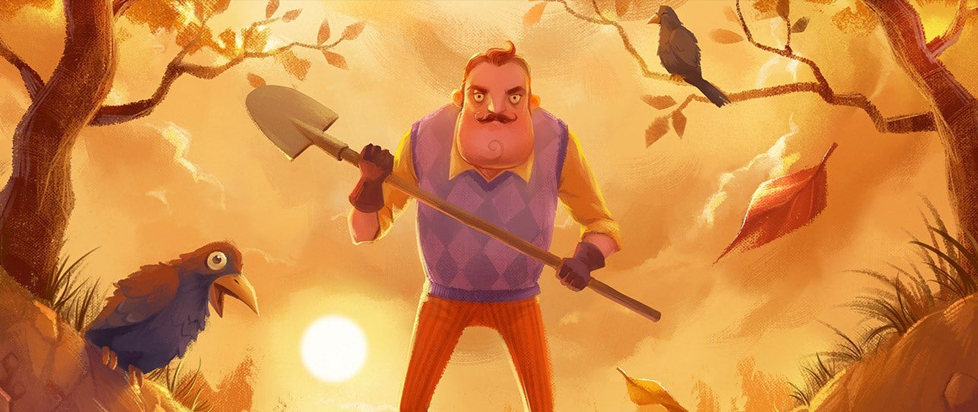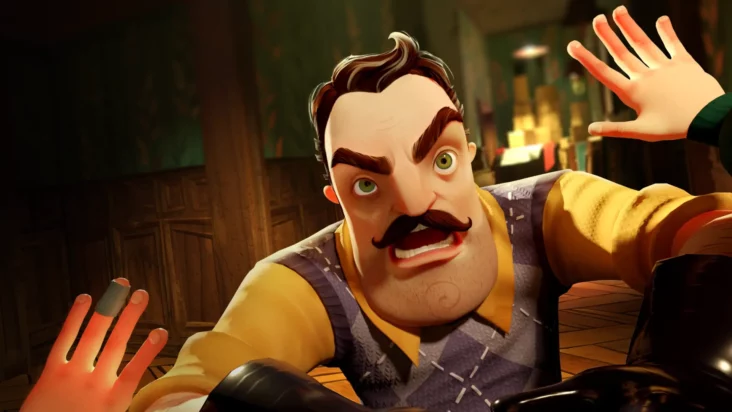
The Discomfort of “Hello Neighbor” in Contemporary America

This column is a reprint from Unwinnable Monthly #180. If you like what you see, grab the magazine for less than ten dollars, or subscribe and get all future magazines for half price.
———
We are what we’re afraid of.
———
The novelist John Gardner once famously said that there are only two kinds of stories: a man goes on a journey, or a stranger comes to town. In stories about suburbia, the plot almost always leans toward the latter. Media like The Burbs and Disturbia showcase our longstanding anxiety about the people who live nearby. How well do we know them, really? Could they be up to something sinister? The story that unfolds is almost always about a plucky hero who uncovers a terrible secret and saves the neighborhood from gruesome death, sending us the message that it’s important to remain vigilant about who we let in to our communities.
The 2017 survival horror game Hello Neighbor plays in these same tropes, with you acting as a kid on the block who accidentally witnesses something untoward and feels compelled to investigate. The game takes a dark turn when the player is locked in the home’s basement, which despite his successful escape, traumatizes him for the rest of his life. The game becomes more and more surreal, as a shadow figure, your trauma made manifest, follows the player through an increasingly surreal version of the home in which you were trapped. In this way, the narrative acts as an apt if slightly on the nose metaphor for how childhood abuse and trauma warps the way we walk through the world as adults. It also forces the player to ask the question “where were the other adults in this scenario? Wasn’t someone looking for that kid? My God, why did no one notice?”
This impetus to pay attention to what is happening to the children around us is unquestionably a good one – according to Child Protect, a children’s advocacy center in Alabama, for every report of abuse or neglect, it’s estimated that twice that number of incidents go unreported. The desire to look the other way, to maintain the homeostasis of a happy suburban neighborhood and not make waves, undoubtedly led to the prolonged suffering of innumerable children, which is an absolutely devastating thing to consider. Similarly, Campus Safety magazine reports that up to 94% of active shooters in schools share their intentions of committing the attack with another person before doing so – if more of those communications were taken seriously and appropriate interventions made, perhaps some deaths could have been prevented.

But in 2024 America, the uncritical idea of “see something, say something” often is itself damaging. Law enforcement are often called frivolously on black pedestrians for doing innocuous things like birdwatching, and some of these incidents end in violence. Anyone who suspects that someone they see is in the country without documentation can call a 24/7 Immigration and Customs Enforcement hotline. There are also calls in states that capitalized on the repeal of Roe v Wade for people to report on community members they suspect of getting an abortion. Some people are even advocating for invasive physical inspection of underage athletes, to ensure that trans children are not permitted to play on a given sports team. Now, more than ever, we are called to notice our neighbors, but for the exact wrong things.
Thus, the rhetoric of Hello Neighbor hits an off-note when you look at it through the lens of today’s politics. Despite it being released less than a decade ago, asking people to become more invasive about their neighbors’ lives, to be ever more watchful about the person in your community who “doesn’t seem quite right,” feels more and more like a call to empower bigotry. After all, the people in American communities who are described as “not fitting in” are rarely ostracized because of violent behavior. Rather, the people under the tightest scrutiny are already the most vulnerable – our queer, trans, and POC neighbors. Turning a blind eye to abuse and neglect is never okay, but that’s exactly the sort of thing swept under the rug by homogenous suburbia, since the people committing violence often look and sound more like them than the people being abused.
The moral of the story here isn’t to not play Hello Neighbor (though, if I’m being honest, the controls are pretty rough); it’s just pointing out that, as with so many things, horror is frequently based in our fear of what we don’t know. And while it’s natural to be wary of new and different things, leaning into that fear or, even worse, telling us that this fear is completely justified, is a fast-track to the sort of tacit, baked-in xenophobia was still see all over our media, in our politics, and in our communities. Be aware of what’s happening around you but use your vigilance to examine who is being empowered by a community, and who is being sidelined or pushed out. That’s the real way to make the ‘burbs safe for everyone.
———
Emma Kostopolus loves all things that go bump in the night. When not playing scary games, you can find her in the kitchen, scientifically perfecting the recipe for fudge brownies. She has an Instagram where she logs the food and art she makes, along with her many cats.




